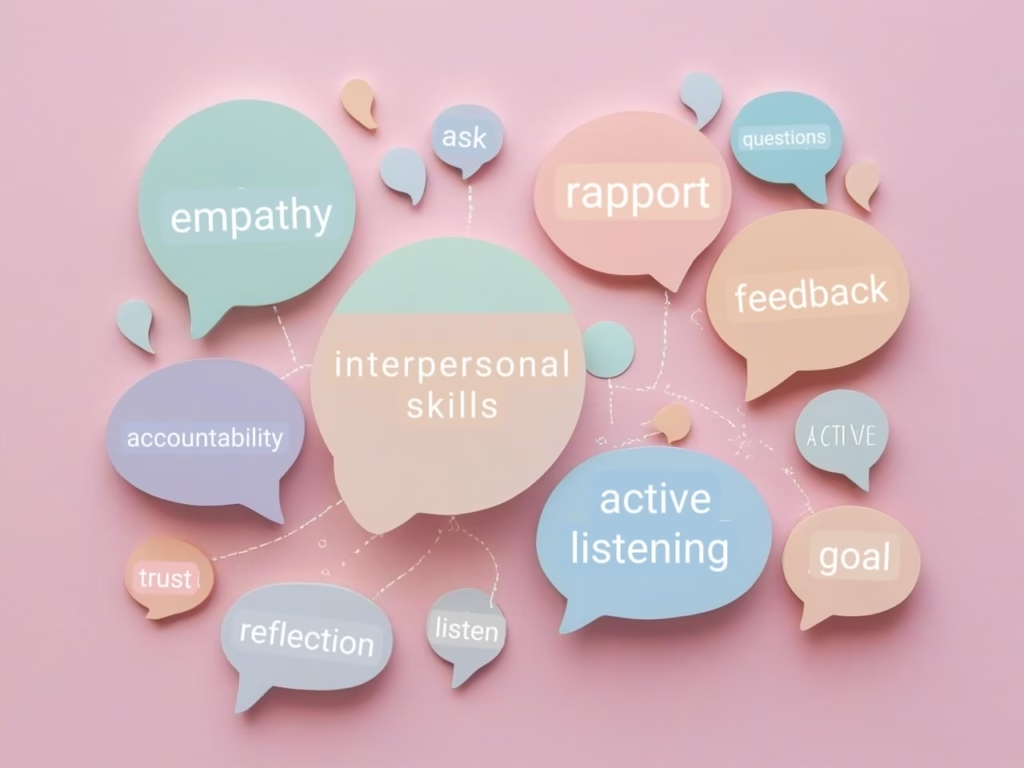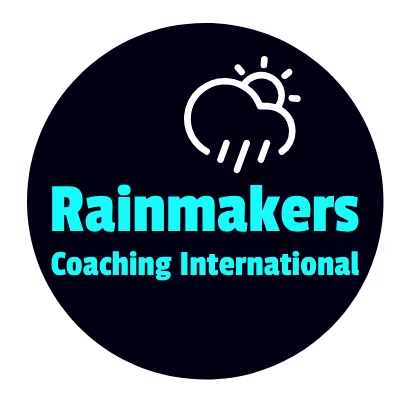Lead with Impact: Coaching Skills That Transform Your Life, Team, and Organization

Table of Contents
In today’s fast-paced world, where change is the only constant, your ability to elevate others through coaching distinguishes you as an exceptional leader. Coaching isn’t just a buzzword; it’s a transformative approach that empowers you and those around you to unlock full potential.
This guide is designed for you—whether you’re a seasoned executive, an aspiring professional certified coach, or someone keen on personal growth. We’ll explore essential coaching principles, strategies, and skills that drive real change.
“True leadership isn’t about being in charge—it’s about empowering others to rise.”
Key Takeaways
- Coaching is leadership in action. Whether you’re a manager, entrepreneur, or aspiring life coach, applying coaching skills helps you lead with empathy, clarity, and confidence.
- You don’t need all the answers—just the right questions. Great coaches use active listening, empathy, and powerful questions to unlock potential and drive results.
- There’s a coaching style that fits your journey. From career coaching to executive coaching and life coaching, you can choose the path that aligns with your personal or professional goals.
- Investing in coaching transforms performance. Many organizations now integrate coaching into their leadership development, human resource management, and team culture—with proven impact on engagement, retention, and innovation.
- You have the power to grow others. Learning to coach, whether through formal coaching courses or guided mentorship, helps you support your team, clients, and community with integrity and impact.
- Leadership isn’t about control—it’s about connection. The most effective leaders today use coaching approaches to inspire growth, improve relationships, and foster trust in every conversation.
Why Coaching Is Essential for Your Leadership Journey
Let’s be honest: navigating today’s workplace challenges can be daunting. Traditional top-down management styles are becoming obsolete. People crave leaders who listen, understand, and coach.
Coaching has evolved into a strategic imperative. Organizations that embrace coaching principles report enhanced performance, increased innovation, and stronger employee retention. The International Coaching Federation (ICF) and other coaching bodies now set global standards, highlighting the profession’s growing significance.
Whether you engage internal or external coaches, investing in a coaching relationship fosters trust, resilience, and tangible results.

What Is Coaching—Really?
Coaching is a structured, goal-oriented, and transformational process. It’s not about dispensing advice or directives. Instead, it’s about creating a space for self-discovery, reflection, and action. Through deep conversations and powerful questioning, coaching helps you access your inner wisdom and clarity.
Unlike mentoring, which draws from the mentor’s experience, or consulting, which offers expert solutions, coaching empowers you to find your own path. This shift—from problem-solving to potential unlocking—is why coaching is so effective across various aspects of life and work.
Types of Coaching to Propel Your Growth
One of coaching’s greatest strengths is its versatility. Here’s how different coaching approaches can meet your unique needs:
1. Life Coaching
If you’re seeking personal goals, purpose, and life balance, life coaching offers a safe space to explore your values and direction. It’s about aligning your actions with what brings you joy and fulfillment.
2. Executive Coaching
For senior leaders and entrepreneurs, executive coaching sharpens decision-making, emotional intelligence, and leadership development. It’s a catalyst for business growth, resilience, and visionary leadership.
3. Career Coaching
Feeling stuck or misaligned in your work? Career coaching helps you gain clarity, build confidence, and design a career that aligns with your values. It’s a game-changer for anyone facing career transitions.
4. Business Coaching
Business coaching is for entrepreneurs, small business owners, and startup founders who are looking to grow their business, increase profitability, enhance operational efficiency, or overcome specific business challenges. It is ideal for those who need guidance on strategy, goal setting, scaling, or navigating complex business transitions.
5. Health and Wellness Coaching
Focusing on behavior change and well-being, this coaching supports you in making healthier life choices—physically, mentally, and emotionally.
Engaging in these coaching types, whether through coaching courses or partnerships with professional coaching experts, contributes to a holistic approach to your growth.

Popular Coaching Approaches That Work For You
Different people need different tools. Here are some of the most impactful and widely used coaching approaches that can help you create powerful breakthroughs—personally and professionally:
Solution-Focused Coaching
Centered on the future you want to create, this approach emphasizes what’s working and helps you design practical steps to move forward. It’s action-oriented, empowering you to take control and see results quickly.
NLP Coaching (Neuro-Linguistic Programming)
NLP coaching uses language, mental strategies, and behavior modeling to help you shift limiting beliefs and patterns. It enables rapid change by aligning your thoughts, emotions, and actions with your goals.
Positive Psychology Coaching
Focusing on what’s right rather than what’s wrong, this approach helps you build on your strengths. It empowers you with a positive mindset to pursue meaningful goals and sustainable success.
Success Principles Coaching (Inspired by Jack Canfield)
Based on the best-selling Success Principles, this approach teaches you to take full ownership of your life, clarify your vision, and take consistent action. It’s a step-by-step formula to help you achieve success from the inside out.
MOSE Coaching (Mastery of Self-Expression by Larry Gilman)
MOSE coaching strips away your masks and helps you reclaim your authentic voice. It challenges you to step into vulnerability, power, and full self-expression so you can lead, communicate, and connect at the deepest level.

Coaching Skills That Elevate Your Leadership
If leadership is influence, then coaching is its most refined form. At the heart of every impactful coaching session are these core skills:
- Interpersonal skills – Effective coaching hinges on mastering these skills that facilitate meaningful client interactions
- Active listening – involving techniques such as maintaining eye contact, paraphrasing for clarity, and avoiding interruptions, is paramount. Research indicates that people retain only a fraction of what is shared during conversations, underscoring the importance of active listening. This skill helps coaches understand clients’ perspectives, validates their experiences, and promotes confidence.
- Empathy and rapport building – allows coaches to connect with clients on a deeper emotional level and validate their emotions. Mirroring body language helps coaches build rapport and foster trust, creating a safe and supportive environment.
- Powerful questioning – thought-provoking questions encourage deeper reflection and insight, enabling clients to uncover their own solutions and pathways to success. These skills collectively enhance coaching effectiveness, leading to more impactful outcomes.
- Goal Setting and Accountability – Coaches help you define individual goals and stay on track, celebrating wins and course-correcting when needed.
- Feedback and Reflection – Constructive feedback, combined with positive psychology principles, reinforces learning and builds confidence.

Developing Self-Awareness Through Coaching
Coaching plays a crucial role in developing self-awareness, essential for personal and professional growth. The guided conversations help clients recognize their strengths and resources, enabling them to achieve specific goals. Coaching’s effectiveness lies in encouraging clients to identify their own solutions, rather than relying on external advice. This self-discovery process fosters greater confidence and empowerment.
Feedback and journaling are invaluable tools for self-reflection. Seeking feedback from others can reveal blind spots and discrepancies in self-perception, crucial for growth. Journaling helps track self-reflection and recognize patterns in behavior and emotions, providing insights for personal development. Combined with coaching, these tools create a powerful framework for enhancing self-awareness and achieving personal goals.
Success stories like Sarah’s and Emma’s illustrate coaching’s transformative impact. Sarah used the GROW Model to enhance her self-confidence, applying strategies like daily affirmations and visualization techniques, leading to improved assertiveness in her career.
Emma improved her work-life balance by adopting time management techniques and self-care practices, reducing stress and increasing satisfaction in both her professional and personal life. These examples highlight how coaching fosters self-awareness and drives meaningful change.

Leadership Development and Coaching
Leadership coaching creates personalized growth paths for leaders, enabling them to realize their full potential and bringing out the best in their team.
Frameworks provided by leadership coaching enhance strategic decision-making, significantly improving leaders’ ability to make informed and effective choices. Leaders participating in coaching often report increased resilience, helping them better handle stress and organizational changes, leading to more robust and adaptable leadership.
The impact of leadership coaching extends beyond individual development, enhancing overall workplace effectiveness. Effective leadership coaching aids in personal and professional growth and fosters a more dynamic and productive work environment. Investing in leadership coaching helps organizations cultivate emotionally intelligent leaders who drive success and innovation.
Coaching Process and Techniques
The coaching process typically involves four key steps: preparation, analysis and exploration, coaching, and action.
Preparation:
Effective preparation includes gathering client information and creating a mindset conducive to coaching.
Analysis & Exploration:
During analysis and exploration, coaches focus on understanding the client’s situation and identifying obstacles to progress. This phase is crucial for setting the stage for meaningful coaching interactions.
Coaching:
Common coaching models like GROW help coaches effectively direct clients toward their goals. The core of coaching lies in guiding clients through powerful questioning and providing constructive feedback, fostering self-discovery and growth.
Action:
An actionable plan with clear milestones helps clients track progress and stay accountable. A personalised coaching process enhances focus and consistency, fostering trust between coach and client. Tailoring methods to each client’s unique needs and cultural context enhances the relationship’s effectiveness.
Success stories like Jessica’s highlight how personalised coaching strategies can lead to significant career transitions and personal growth.

Building a Successful Coaching Relationship
A successful coaching relationship is built on trust and transparency. Maintaining confidentiality and being transparent about the coaching process establish trust. Creating a non-judgmental space encourages clients to share vulnerabilities, fostering open communication and a deeper connection.
Setting clear expectations regarding communication and availability helps define the relationship and ensures alignment on goals. Regularly reviewing and adjusting goals keeps clients motivated and aligned with their aspirations. Celebrating small wins reinforces clients’ efforts and encourages continued progress.
These practices collectively enhance the coaching relationship, leading to more productive outcomes.
Benefits of Coaching for Organizations
Effective coaching contributes to elevated organisational performance through the development of emotionally intelligent leaders. MetrixGlobal Study found that executive coaching program yielded a 788% return on investment (ROI), primarily due to improvements in productivity and employee retention.
Investing in leadership coaching helps organisations retain top talent by demonstrating a commitment to employee development. When companies show they care about employee growth through coaching, it positively impacts retention and job satisfaction. Organizations investing in coaching often attract top talent, as a robust coaching culture signals commitment to employee development.
According to the ICF, organisations that implemented executive coaching experienced a 70% improvement in individual performance, a 50% increase in team performance, and a 48% enhancement in organizational performance.
Coaching promotes a culture of feedback, fostering an environment where growth and open communication thrive. These examples highlight coaching’s significant benefits to organisations, driving performance, retention, and satisfaction.

Case Studies and Success Stories
Coaching’s versatility and impact are evident across various sectors. A healthcare organization implemented coaching strategies to improve staff morale and reduce burnout. The initiative led to an increase in patient satisfaction scores, showcasing measurable success. This case exemplifies the transformative outcomes achievable through well-structured coaching programs.
Research published in Harvard Business Review indicates that corporate programs supporting work-life balance promote productivity, reduce turnover, and improve employees’ mental and physical health.
Data collected since 2019 across 19 countries by Indeed and University of Oxford Collaboration led to the creation of the Work Wellbeing Score. Companies ranking high on this score outperformed major stock indices, highlighting the value of workplace culture that supports individuality and growth.
Coaching’s effectiveness is evident across different industries, from healthcare to business. These case studies and success stories highlight coaching’s practical applications and benefits, inspiring others to explore it as a tool for personal and professional growth. These real-life examples show how coaching leads to significant improvements and success.
Continuous Learning and Development for Coaches
Continuous learning and development are essential for coaches to maintain their effectiveness and relevance. A professional certified coach must demonstrate their ongoing professional development to maintain their certification. Engaging in Continuous Professional Development (CPD) enhances a coach’s skills and helps them integrate new coaching strategies. This ongoing education boosts a coach’s self-awareness and reflection, allowing them to refine their coaching methods.
CPD provides opportunities for coaches to network, exchange knowledge, and collaborate with peers and industry experts. It can also lead to career development and advancement by equipping coaches with new skills that allow for diversification of their services. By committing to continuous learning, coaches can ensure they provide the highest quality of support to their clients.

Final Thoughts
Coaching is a transformative tool that fosters personal and professional growth through various specialized types, essential skills, and popular approaches. The coaching process, supported by a strong coach-client relationship, leads to significant improvements in self-awareness, leadership development, and organizational performance. Real-life case studies and success stories highlight the tangible benefits of coaching across different sectors.
Choosing the right coach and committing to continuous learning are vital for maximizing the impact of coaching. By embracing these principles, individuals and organizations can unlock their full potential and achieve lasting success. So, take the first step towards your growth journey and explore the world of coaching today!

Frequently Asked Questions
1) What is the difference between coaching and mentoring?
Coaching:
Client-driven: Coaches use powerful questions, active listening, and reflection to help clients discover their own solutions. They focus on unlocking potential, not giving advice.
Mentoring:
Experience-based: Mentoring is often long-term and based on a relationship where the mentor shares wisdom, guidance, and insights from their own experience. Mentors offer advice based on “what worked for them.”
2) How does life coaching differ from traditional mentorship?
Life coaching takes a holistic and forward-focused approach, addressing all aspects of your life, while traditional mentorship typically hones in on specific areas. Embrace the broader possibilities with life coaching for a more transformative journey!
3) What are some key skills required for effective coaching?
To be an effective coach, develop skills like active listening, empathy, and the ability to ask open-ended questions. These skills will help you build strong connections and guide your clients toward success!
4) How can organizations benefit from investing in coaching?
Investing in coaching fosters strong leadership, boosts employee retention, and enhances overall performance, creating a more effective and engaged workforce. Embrace coaching to unlock your organization’s full potential!
5) What should I consider when choosing a coach?
Choose a coach with recognized certifications and relevant training who resonates with your preferred coaching style and aligns with your goals to ensure a positive and effective experience. Your growth starts with the right guide!
Ready to Accelerate Your Growth?
If you’re ready to start living boldly and lead with impact, working with a professional coach could be your next step. With over a decade of experience helping high achievers find their clarity, confidence, and calling, Coach Rainy is here to walk beside you.
Book your 90 minutes complimentary coaching call now
Schedule Your Coaching Call
You don’t have to do this alone.
What’s Next?
Find out if your confidence level is undermining your success here.
Wondering if you are ready for coaching? Take this coaching readiness questionnaire


